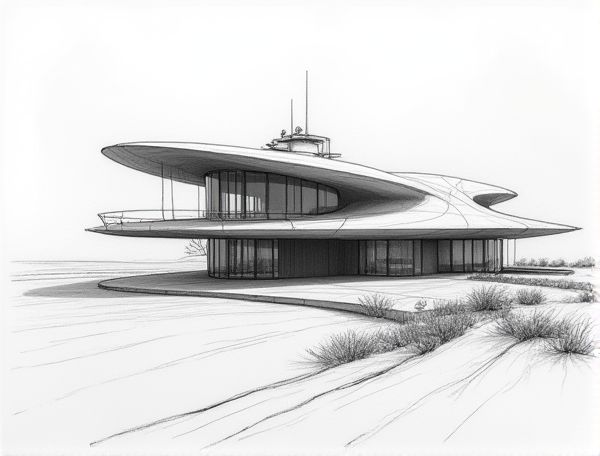
Photo illustration: Neo-futuristic home design with aerodynamic rooftop turbines
Neo-futuristic home design integrates aerodynamic rooftop turbines to enhance energy efficiency while creating sleek, cutting-edge aesthetics that symbolize innovation and sustainability in modern living. Explore how incorporating these dynamic elements can transform Your home into a visionary space by reading more in the article.
Introduction to Neo-Futuristic Home Design
Neo-futuristic home design emphasizes sleek, dynamic forms combined with cutting-edge technology and sustainable materials to create innovative living spaces. This architectural style integrates smart home systems, eco-friendly features, and bold geometries that respond to modern lifestyles and environmental concerns. The result is a visually striking, functional environment that pushes the boundaries of conventional residential design.
Key Principles of Neo-Futuristic Architecture
Neo-futuristic architecture prioritizes sustainability, innovative materials, and dynamic, fluid forms that integrate advanced technology with ecological consciousness. Emphasis on adaptive spaces, energy efficiency, and seamless interaction between interior and exterior environments defines its forward-thinking design approach.
Integrating Sustainable Technologies in Home Design
Incorporating solar panels and energy-efficient HVAC systems significantly reduces a home's carbon footprint while lowering utility costs. Utilizing smart home technologies such as automated lighting and climate control enhances energy conservation and improves occupant comfort. Sustainable materials like reclaimed wood, bamboo flooring, and low-VOC paints contribute to healthier indoor air quality and environmental preservation.
The Role of Aerodynamic Rooftop Turbines
Aerodynamic rooftop turbines harness wind energy to improve home energy efficiency by reducing reliance on conventional power sources while promoting sustainable living. Their streamlined design minimizes drag and noise, optimizing airflow conversion into renewable energy and enhancing overall home aerodynamics.
Energy Efficiency Benefits of Rooftop Turbines
Rooftop turbines harness wind energy to significantly reduce your home's reliance on traditional power sources, lowering electricity bills and carbon emissions. These turbines optimize energy efficiency by converting rooftop wind currents into clean, renewable energy, ensuring a sustainable and cost-effective power supply. Integrating rooftop turbines enhances your home's energy performance, contributing to a greener and more resilient living environment.
Aesthetic Appeal and Functional Design Synergy
Achieving a balance between aesthetic appeal and functional design enhances your living space by creating environments that are visually pleasing yet practical for everyday use. Integrating ergonomic furniture with stylish decor ensures both comfort and sophistication, elevating the overall ambiance of your home.
Case Studies: Homes with Aerodynamic Turbine Rooftops
Homes with aerodynamic turbine rooftops demonstrate significant improvements in energy efficiency by harnessing wind power through sleek, curved designs that minimize drag and maximize airflow. These innovative rooftops reduce your reliance on traditional energy sources while seamlessly integrating into modern architectural styles for both aesthetic appeal and environmental benefits. Case studies reveal a consistent reduction in energy bills and carbon footprints in residences employing this cutting-edge renewable technology.
Environmental Impact and Carbon Footprint Reduction
Incorporating sustainable materials and energy-efficient technologies in home design significantly reduces your environmental impact and carbon footprint. Utilizing solar panels, high-performance insulation, and eco-friendly building materials minimizes greenhouse gas emissions while enhancing energy conservation. Smart home systems optimize energy use, contributing to a greener, more sustainable living environment.
Future Trends in Neo-Futuristic Residential Design
Neo-futuristic residential design emphasizes the integration of advanced technologies such as AI-driven climate control systems, smart glass, and adaptive structural materials that respond dynamically to environmental changes. Sustainable innovations, including solar energy harvesting facades and biophilic design elements, dominate trends by enhancing energy efficiency while fostering a seamless connection between indoor and outdoor living spaces.
Challenges and Solutions in Implementation
Implementing home design projects often faces challenges such as budget constraints, space limitations, and coordinating multiple contractors. Effective solutions include detailed planning using 3D modeling tools to visualize space utilization and setting clear communication channels with all parties involved. Your proactive engagement in decision-making ensures smooth project execution and helps avoid costly delays.
 homedesy.com
homedesy.com